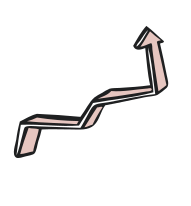







Inflation; it impacts you more than you think!

It has been in the news a lot lately...inflation. You might have heard that it’s high, and that people are starting to worry about it more. So what’s going on, and what does that mean for your money? Let’s break it down.
Firstly, what is inflation?
Inflation is the upward creep of the prices of goods and services. It usually happens because the demand for goods and services is rising faster than companies can produce and supply them. It’s basic supply and demand. That makes them more scarce, which makes them more valuable, which pushes prices up. When wages don’t rise to match, that creates a decrease in purchasing power. (Translation: Things cost more and you’re not making more, so you can’t buy as many things.)
Inflation is often measured using a standard benchmark like the Consumer Price Index (CPI). The CPI is calculated by looking at a standard set (“basket”) of goods (food, medical care, clothing, etc) and averaging their change in price over time.
What’s going on with inflation now?
It’s higher than people have gotten used to, with a climb that started in late 2020. In September, the CPI in New Zealand was up nearly 5% compared to this time last year — its biggest jump in 10 years. In the United States, the CPI was up nearly 6%, it’s biggest move in over 30 years!
For a while, officials were calling this year’s inflation “transitory” (aka temporary), with the expectation that it would subside by the end of 2021. And until this month, it did look like it was starting to slow down — but now it’s picked back up again.
Does this have anything to do with the pandemic? Yes, yes it does. And all the supply chain congestion is pushing up prices. Also, fuel and rent prices are increasing. And while wages are rising too, as employers try to retain people, that growth hasn’t yet been enough to keep up with inflation.
What does rising inflation mean for my money & my investments?
It’s impossible to know what will happen in the future, but here are some things to think about.
Firstly, don’t keep more than you need to in cash. This is something we say anyway — but when inflation is high, cash gets less valuable, so the advice becomes even more urgent. Savings accounts barely keep up with inflation in the best of times, but with term deposit rates at around 1-2%, even savings accounts are falling way short.
If you’re already taking a bit more risk than keeping money in the bank, and investing for long-term goals (those more than a few years away), we’d probably recommend that you just keep doing what you’re doing. Every period of inflation is different, and in the past, it’s affected different types of investments in different ways (which is, after all, the point of having a portfolio).
What we do know is that periods of economic uncertainty tend to make the markets nervous, which can lead to volatility. So we recommend using a technique called ‘dollar-cost averaging’, which means investing regularly, a little bit at a time, no matter what’s going on in the market. You’ll end up investing when markets are up and down in a way that evens out over time. It takes the timing guesswork out of it.
Plus, we don’t know how long higher inflation will last — it could be only a few more months. The longer your timeline, the less inflation is likely to impact your eventual bottom line.
Aso, keep an eye on interest rates. If inflation remains at recent levels or keeps rising, one thing the Reserve Bank of New Zealand could do to try to keep it in check is raise the Official Cash Rate (OCR). That would make variable interest rates on things like credit cards go up, too. So if you can put a little extra toward your debt now, you probably won’t regret it. And if you’re considering some sort of loan with a fixed interest rate (mortgage or student loan refinance, home equity line of credit, etc), it could be good to try to lock that in now.
On the flip side, rising interest rates would also lead to higher interest rates paid by savings accounts. If you have a large chunk of cash in the bank (like a complete emergency fund, for example), see if you can find a savings account that will change its interest rates quickly in response.
So in summary, we don't know how long this period of higher inflation will last. All we can do is try to make the best choices we can with the information we have — and adjust along the way.


